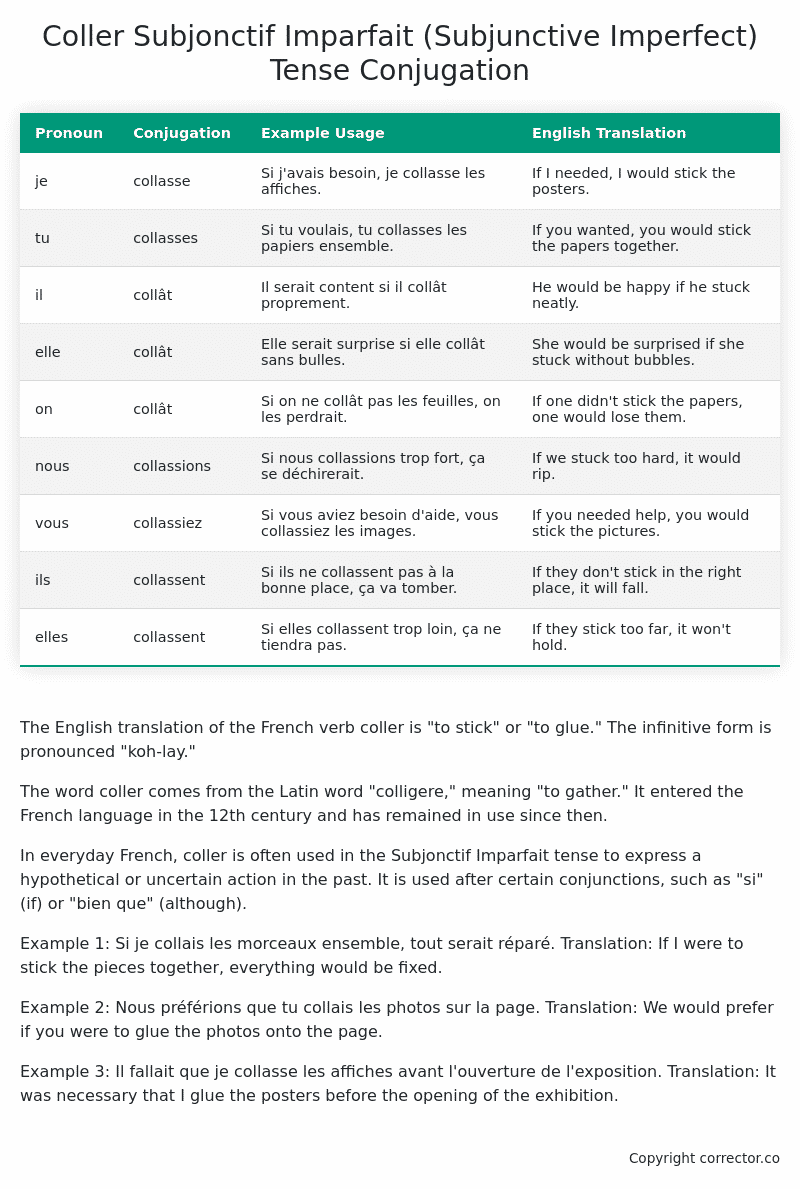Subjonctif Imparfait (Subjunctive Imperfect) Tense Conjugation of the French Verb coller
Introduction to the verb coller
The English translation of the French verb coller is “to stick” or “to glue.” The infinitive form is pronounced “koh-lay.”
The word coller comes from the Latin word “colligere,” meaning “to gather.” It entered the French language in the 12th century and has remained in use since then.
In everyday French, coller is often used in the Subjonctif Imparfait tense to express a hypothetical or uncertain action in the past. It is used after certain conjunctions, such as “si” (if) or “bien que” (although).
Example 1: Si je collais les morceaux ensemble, tout serait réparé.
Translation: If I were to stick the pieces together, everything would be fixed.
Example 2: Nous préférions que tu collais les photos sur la page.
Translation: We would prefer if you were to glue the photos onto the page.
Example 3: Il fallait que je collasse les affiches avant l’ouverture de l’exposition.
Translation: It was necessary that I glue the posters before the opening of the exhibition.
Table of the Subjonctif Imparfait (Subjunctive Imperfect) Tense Conjugation of coller
| Pronoun | Conjugation | Example Usage | English Translation |
|---|---|---|---|
| je | collasse | Si j’avais besoin, je collasse les affiches. | If I needed, I would stick the posters. |
| tu | collasses | Si tu voulais, tu collasses les papiers ensemble. | If you wanted, you would stick the papers together. |
| il | collât | Il serait content si il collât proprement. | He would be happy if he stuck neatly. |
| elle | collât | Elle serait surprise si elle collât sans bulles. | She would be surprised if she stuck without bubbles. |
| on | collât | Si on ne collât pas les feuilles, on les perdrait. | If one didn’t stick the papers, one would lose them. |
| nous | collassions | Si nous collassions trop fort, ça se déchirerait. | If we stuck too hard, it would rip. |
| vous | collassiez | Si vous aviez besoin d’aide, vous collassiez les images. | If you needed help, you would stick the pictures. |
| ils | collassent | Si ils ne collassent pas à la bonne place, ça va tomber. | If they don’t stick in the right place, it will fall. |
| elles | collassent | Si elles collassent trop loin, ça ne tiendra pas. | If they stick too far, it won’t hold. |
Other Conjugations for Coller.
Le Present (Present Tense) Conjugation of the French Verb coller
Imparfait (Imperfect) Tense Conjugation of the French Verb coller
Passé Simple (Simple Past) Tense Conjugation of the French Verb coller
Passé Composé (Present Perfect) Tense Conjugation of the French Verb coller
Futur Simple (Simple Future) Tense Conjugation of the French Verb coller
Futur Proche (Near Future) Tense Conjugation of the French Verb coller
Plus-que-parfait (Pluperfect) Tense Conjugation of the French Verb coller
Passé Antérieur (Past Anterior) Tense Conjugation of the French Verb coller
Futur Antérieur (Future Anterior) Tense Conjugation of the French Verb coller
Subjonctif Présent (Subjunctive Present) Tense Conjugation of the French Verb coller
Subjonctif Passé (Subjunctive Past) Tense Conjugation of the French Verb coller
Subjonctif Imparfait (Subjunctive Imperfect) Tense Conjugation of the French Verb coller (this article)
Subjonctif Plus-que-parfait (Subjunctive Pluperfect) Tense Conjugation of the French Verb coller
Conditionnel Présent (Conditional Present) Tense Conjugation of the French Verb coller
Conditionnel Passé (Conditional Past) Tense Conjugation of the French Verb coller
L’impératif Présent (Imperative Present) Tense Conjugation of the French Verb coller
L’infinitif Présent (Infinitive Present) Tense Conjugation of the French Verb coller
Struggling with French verbs or the language in general? Why not use our free French Grammar Checker – no registration required!
Get a FREE Download Study Sheet of this Conjugation 🔥
Simply right click the image below, click “save image” and get your free reference for the coller Subjonctif Imparfait tense conjugation!

Coller – About the French Subjonctif Imparfait (Subjunctive Imperfect) Tense
Formation
Common Everyday Usage Patterns
Interactions with Other Tenses
Subjonctif Présent
Indicatif Passé Composé
Conditional
Conditional Perfect
Summary
I hope you enjoyed this article on the verb coller. Still in a learning mood? Check out another TOTALLY random French verb conjugation!


